
One of our main priorities is to ensure universal access to, and informed use of effective contraception. Millions of people lack the knowledge and information to determine when or whether they have children, and they are unable to protect themselves against sexually transmitted infections (STIs).
Articles about Contraception
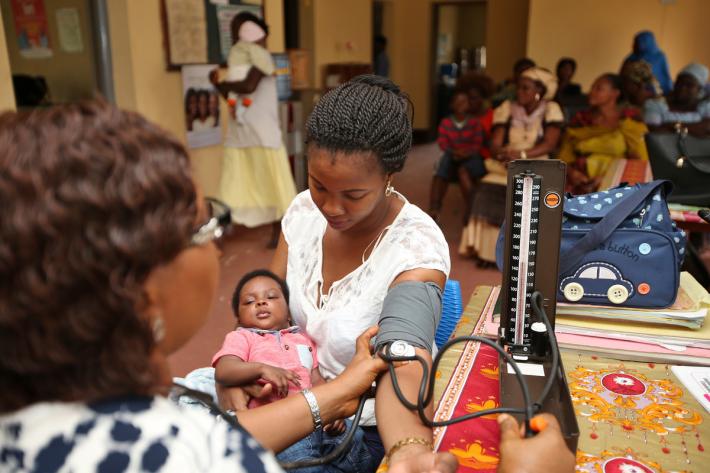
A Nigerian mother's renewed faith in family planning
"I decided to use this clinic because I heard a lot of success stories about it. I trust their judgment that is why I am here.” Taiwo Ogunfayo, a 33-year-old interior decorator, is a client at the Liberty Stadium Clinic – one of Planned Parenthood Federation of Nigeria (PPFN) facilities in Ibadan, the Oyo State capital in South West Nigeria. “One day, I was in the market when I came across a PPFN outreach. The way the Community Health Extension Workers were explaining the different family planning methods was very simple to understand. “I have come across a lot of women since my first visit to this place and they all assured me that family planning works and it won't fail like a previous experience, but I didn't let that stop me from trying family planning again." Lack of adequate information is creating misinformation and wrong perceptions about family planning. She says that 'a lot of women have all sorts of beliefs about family planning, tied to religion and culture', hence the need for more PPFN community outreach services. "It was through the outreach service in my community that I found out about PPFN. The interesting thing about the Planned Parenthood Federation of Nigeria project in Oyo state is that all the family planning methods are free if you can't afford to pay. There is no cost to the patient." The team Read more about the team behind Nigeria's amazing success
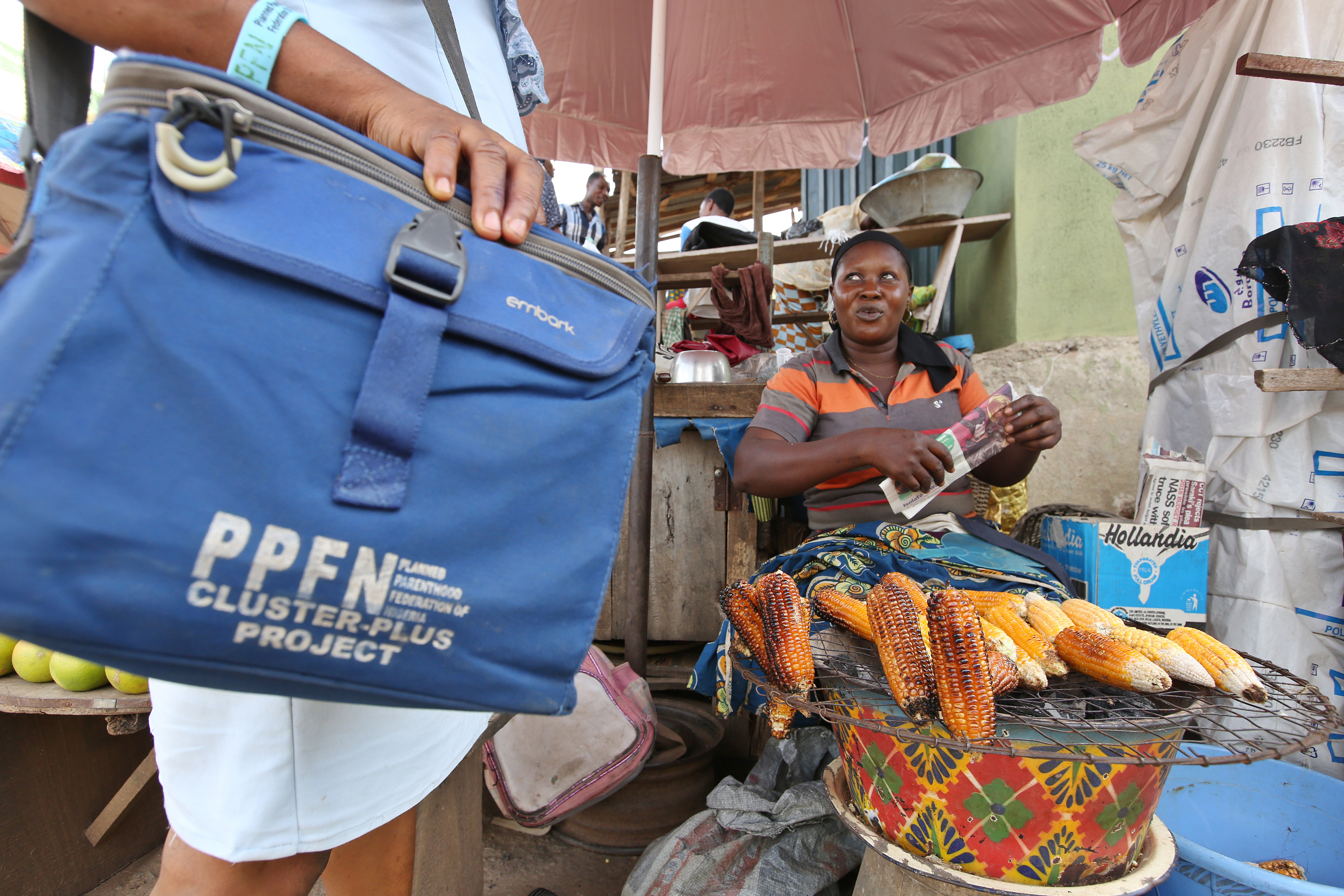
The story behind changing lives in Nigeria
SIZE defines many things about Nigeria. Being Africa’s most populous country ensures that plenty of the issues it faces are big. Nigeria’s population is around 188 million, and growing at more than 3% a year. Around a quarter of young women will be mothers or pregnant by the age of 19. One reason is a historically low use of contraception – at around 10%. One estimate suggests 35% of 15-24-year-olds who want access to contraception can’t get it – creating a huge unmet need for family planning. Nigeria’s Government has pledged to do something about that gap. It wants to increase the use of contraception to 36% by 2018 - its part in the global effort to give women around the world equal access to contraception. And a pilot programme run in Oyo State by the Planned Parenthood Federation of Nigeria (PPFN), IPPF’s national member, has offered startling progress. ClusterPLUS is something of a hybrid. It was built on the foundation of PPFN’s previous work but added new thinking, including ideas developed by IPPF member associations in Kenya and Uganda, who helped PPFN adapt them for Nigeria. At its heart is a simple concept - partnership. The closer you can get to local communities, the better you work with national and local government and more you try to build local ownership, the better. The project used PPFN’s earlier development of “clusters” of clinics, pharmacies and other outlets, as a base. The original cluster project, introduced in 2009, was funded in part by the UK Department for International Development. One ClusterPLUS innovation was a tireless approach to community outreach. In villages without permanent centres, clinics would set-up for three days at a time in schools, churches, markets or mosques. But to make sure everyone who could benefit from them knew they were coming, workers armed with enthusiasm and megaphones would go around drumming-up interest first. These CHEWS (Community Health Extension Workers), lent from Nigeria’s Ministry, did far more than generate publicity though. They also lived in the communities and were trained to supply forms of contraception themselves. Women unable to get to a clinic, perhaps because of work, could visit a CHEW at home in the evening. Often they might bring a friend too. Greater accessibility boosted the numbers of women using contraception. Sherifat Adelke is a 32-year-old CHEW with the Joy Hospital in Ibadan. She thinks her Islamic faith helped one fellow Muslim to end his opposition to his wife using contraception. “He was furious at me and kept looking at my Hijab. Then he asked me if I was a Muslim at all. I told him the Quran didn’t instruct Muslims not to use Family Planning. After enough lecture, he agreed. That was a victory for me.” Male opposition wasn’t anything new. PPFN was already using “male motivators” to combat men’s ignorance about contraception. Owolabi Temidayo is one male motivator in Ibadan. “Some men believe that when their wives start using family planning they will become promiscuous. Others believe if their wives have implants they won’t be able to enjoy intercourse. The religious ones believe family planning is a sin. "I go places to educate men. I go to motor parks, markets, town hall meetings, speaking on the need for family planning. It goes a long way in clearing the misinformation out there.” One partnership which proved critical to ClusterPLUS was between PPFN and local government in Oyo State – it helped to galvanise local leadership and create buy-in from officials. And the support was concrete. As well as providing three clinical staff, local authorities supplied the contraceptives and places for training, for meetings and for clinics. ClusterPLUS also set out to emphasize the benefit of long acting forms of contraception such as implants and IUCDs. And their provision was integrated with other services. Someone coming to a clinic for breast or cervical cancer screening or a test for HIV or a sexual transmitted infection would find family planning available there and then. Reaching those in poorer communities was also a priority. 28-year-old Tawa Agungbaide was responsible for making sure that one group of 63 women who couldn’t afford to pay for contraception gain access to it nevertheless. “We realized finance was a huge challenge. In some instances, it wasn’t a question of paying for services, but also of not even having enough money to pay for their transport to a clinic.” The solution, says Tawa, was a voucher scheme, funding transport and contraception for women who simply couldn’t fund it themselves. It helped her group and many others. “With eligibility criteria, we were able to single women who really couldn’t afford family planning. The voucher scheme was able to solve that. I feel fulfilled helping these women.” And new technology has played a major part too. An app on tablets and smartphones allowed health workers to input what they’d handed out every day – quickly and in real time. The supply team could then make sure that a delivery point never ran out of supplies – avoiding the dreaded stock-out. How well has it worked? The figures are impressive. The project aimed to reach 20,200 people in its nine months. It actually got to 53,152 clients. But as well as reaching more people, with more family planning services, it also gave women wider choice about the form of contraception they wanted. Two thirds of new users chose long-acting forms of contraception, more than double the rate outside of the project. The aim for PPFN now is to roll out the same approach across Nigeria, reaching more young people, especially poorer women. ClusterPLUS is already running in three other states in Nigeria – and if it proves as successful as in Oyo State, Nigeria’s Government will be making big progress towards its family planning pledge. See this full interactive success story from Nigeria
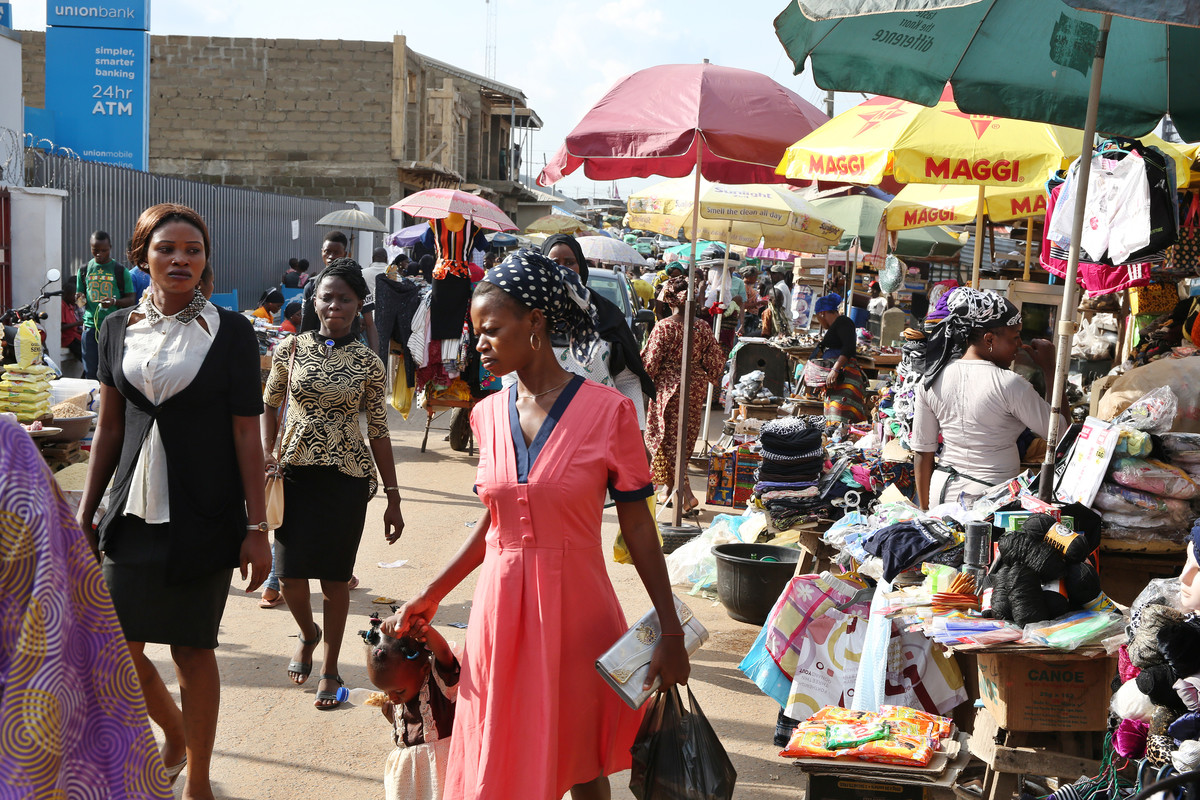
Leaders must take action now to help women and girls
For the last 16 years, health worker, Olufemi Fabiyi has gone out to some of the hardest areas to reach in rural parts of Nigeria to give sexual and reproductive health services to some of the world’s poorest people. She’s seen a lot during that time but one particular story stands out for her. One day she was in a market when she was approached by a man who appealed for her to visit his younger sister. When she got there she met his sister who looked about 50. It turned out she was just 29-year-old but she had already had 12 children because she had not been able to get contraception. “The burden and labour of delivering 12 children could be seen all over her,” Olufemi said. She was worried about how the woman could possibly raise that many children and how she would support them financially. This woman, like 230 million others around the world, wanted to get contraception so she could decide how many children to have and when she wanted to have them but the services were not available to her. As the world marks the first anniversary of the adoption of the Sustainable Development Goals (SDGs) we believe that we have the opportunity to help women and girls in the same situation around the world. The SDGs set out a global commitment to end poverty and to ensure sustainable development was not ignored. Only twelve months ago, every government at the United Nations signed up to the 2030 Agenda on Sustainable Development and agreed to take unprecedented steps to achieve gender equality and ensure access to sexual and reproductive health. The commitment is there but we now need to make sure that this translates into action on the ground, action at country level around the globe. At the International Planned Parenthood Federation we believe that the ambition set out in the SDGs is clear. Gender equality, women’s and girls’ human rights, and the empowerment of girls and women will not be possible without the realization of sexual and reproductive health and rights. Providing the full range of sexual and reproductive health services, information and education so that all women and girls can make free and informed choices about their sexuality and their reproductive lives is a basic human right and central to realising the full range of women’s rights, and to progressing gender equality. If we work together and harness the commitment of organisations such as my own, we can collectively develop programmes and policies that will allow every country to deliver on the commitments that they made just one year ago. Achieving sexual and reproductive health and rights, and gender equality is not just an end in itself. Enabling everyone to access these life-changing services will support the elimination of poverty and hunger, achievement of gender equality and quality education, reduction of inequality, adaptation to climate change, and sustainable consumption. Without access to sexual and reproductive health services and education achieving some of the other goals will become a much harder task, while others will be impossible to realise. Words are easy but now is the time for real political will to translate these ambitions into action. We cannot risk failing on all the goals due to a lack of political will to implement those related to gender equality and SRHR. It’s time we held politicians to account to ensure that every woman and girl - wherever they live - can get the contraception they want so they can choose for themselves and their children. Celebrate the 1st Birthday of the SDGs with us! Share the cake and share our message: sexual and reproductive rights are crucial for the achievement of the Sustainable Development Goals!
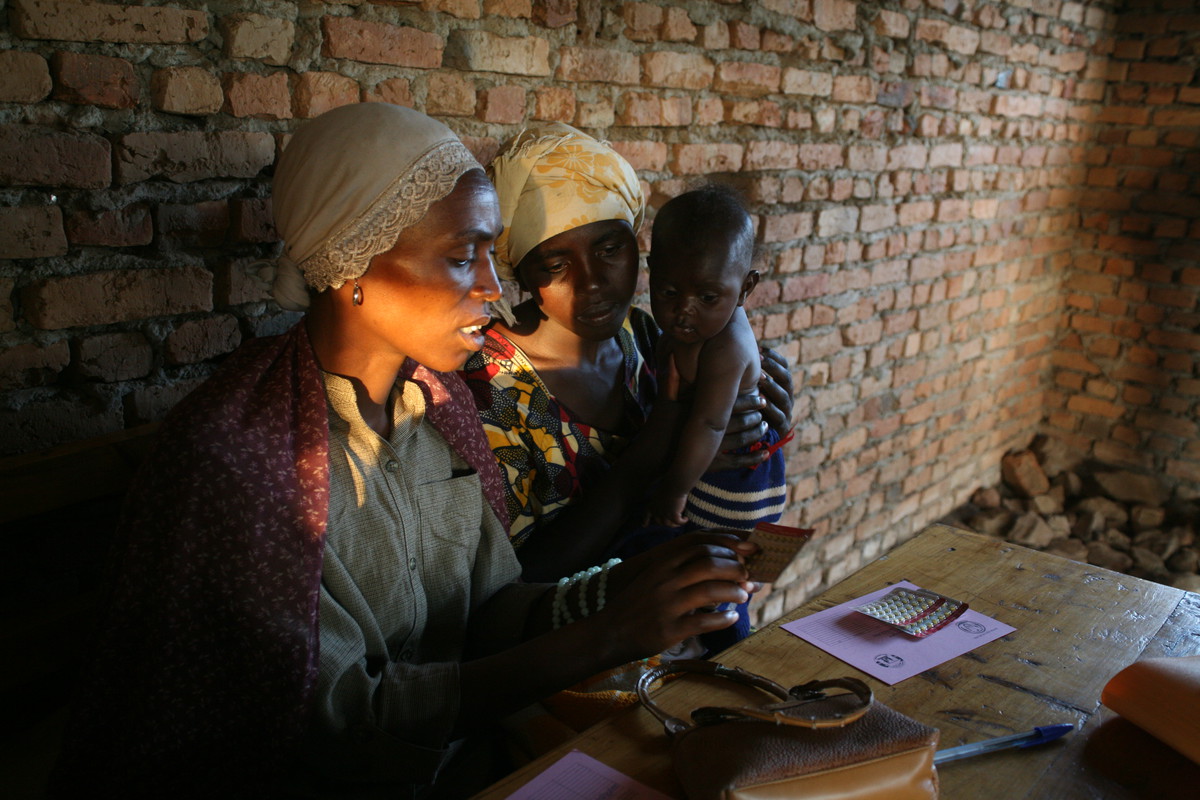
Campaign to tackle global contraceptive crisis
A petition has been launched calling for the United Nations Secretary General Ban Ki-Moon to tackle a looming global contraceptive crisis which threatens to put the health and well-being of thousands of women at risk. The International Planned Parenthood Federation (IPPF), in collaboration with the Reproductive Health Services Coalition (RHSC), PAI and Marie Stopes International (MSI), has launched a digital advertising campaign in the online version of Guardian Newspaper today calling for urgent action to be taken. .@Bankimoon_amdg tell world leaders to keep their promises to women. https://t.co/nhY2Iu8pUs #FPCrisis #WCD2016 pic.twitter.com/BXQOK1PaAg — PAI (@pai_org) September 19, 2016 The availability of contraceptives relies largely on funding from donor countries. As donors are falling short on their promises, it is leading to a crisis in getting contraceptives into the countries that need them most. UNFPA is the only agency equipped to provide sexual and reproductive health care to women and girls in conflicts and emergencies and UNFPA Supplies provides approximately 40% of donated commodities to low and middle income countries. Indications show that there is a funding gap of around $273 billion between now and 2020. Projections show that by 2020, 397 million women will be using modern methods of contraception throughout more than 130 developing countries. If the funding gap is not closed, the needs of these women will not be met. At the same time, most developing country governments have not made sufficient investments in contraceptives to fill the gap and meet the needs of women. Access to contraception is transformative for women and communities. It is linked to greater gender equality, educational attainment and even economic development. Every $1 invested in sexual and reproductive health and unmet need for family planning has the potential to save $120 in other areas. The Sustainable Development Goals (SDGs) cannot be achieved without sustained investment in reproductive health supplies, as a reduction in unintended pregnancy is critical to health, wealth and wellbeing. And, a failure to meet the contraceptive needs of women has the potential to derail progress already made. The petition calls for the Ban Ki-Moon to highlight the centrality of contraceptives to achieving the sustainable development goals. It calls for global leaders and donors must prioritise funding for contraceptives and the systems that deliver them on the global agenda. Please sign the petition. The home page for the campaign is here.
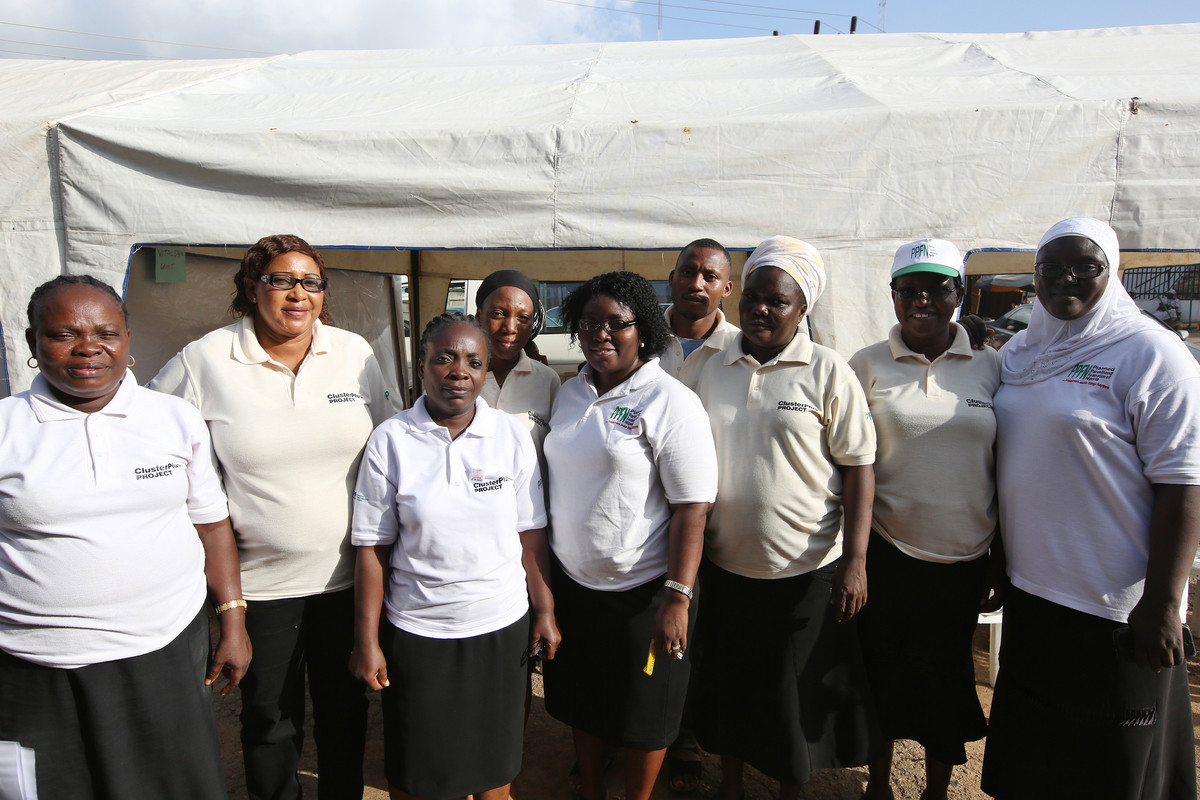
Creating a one-stop shop of services in Nigeria
On the ground in Nigeria, one of programme officers explains why outreach is so successful: “The project was a one-stop shop which brought services together. So a woman could have screening for breast and cervical cancer, counselling and have access to all methods of family planning at the same place. Also if a woman was detected with early stage of cervical cancer, we were able to carry out a curative operation."
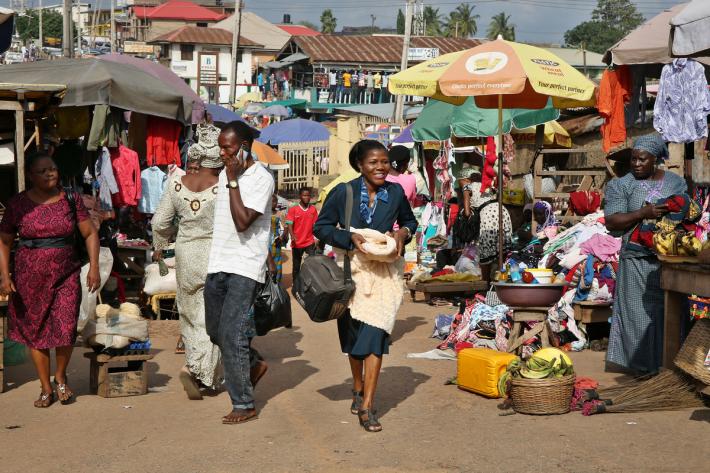
Working in the community
Olusula, 40, is a Community Health Extension Worker in Nigeria. "I refer clients through vouchers to the facility of their choice for long acting and reversible contraceptive methods too", she says.
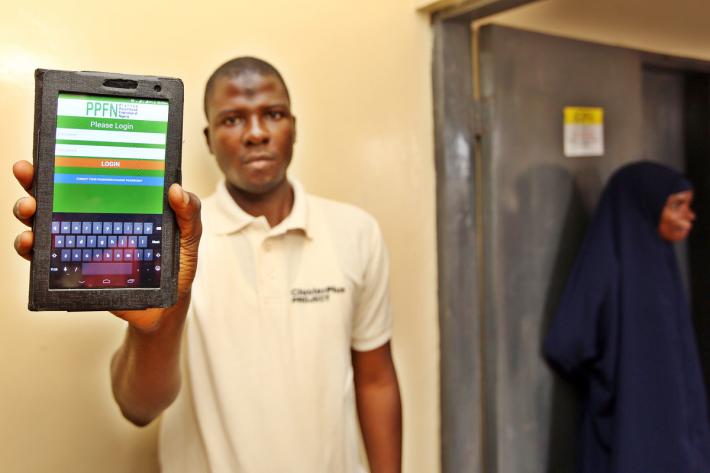
Commodities and supplies
Monitoring and evaluation officer, Babatunde, is responsible for ensuring the supply of contraceptives for all the IPPF facilities in Nigeria, via an app. "I provided training on the mobile app for the store keepers at the facilities we worked with. All through the nine months of the Clusterplus Project, no facility ever ran out. This meant family planning methods were always available to those that needed them.”
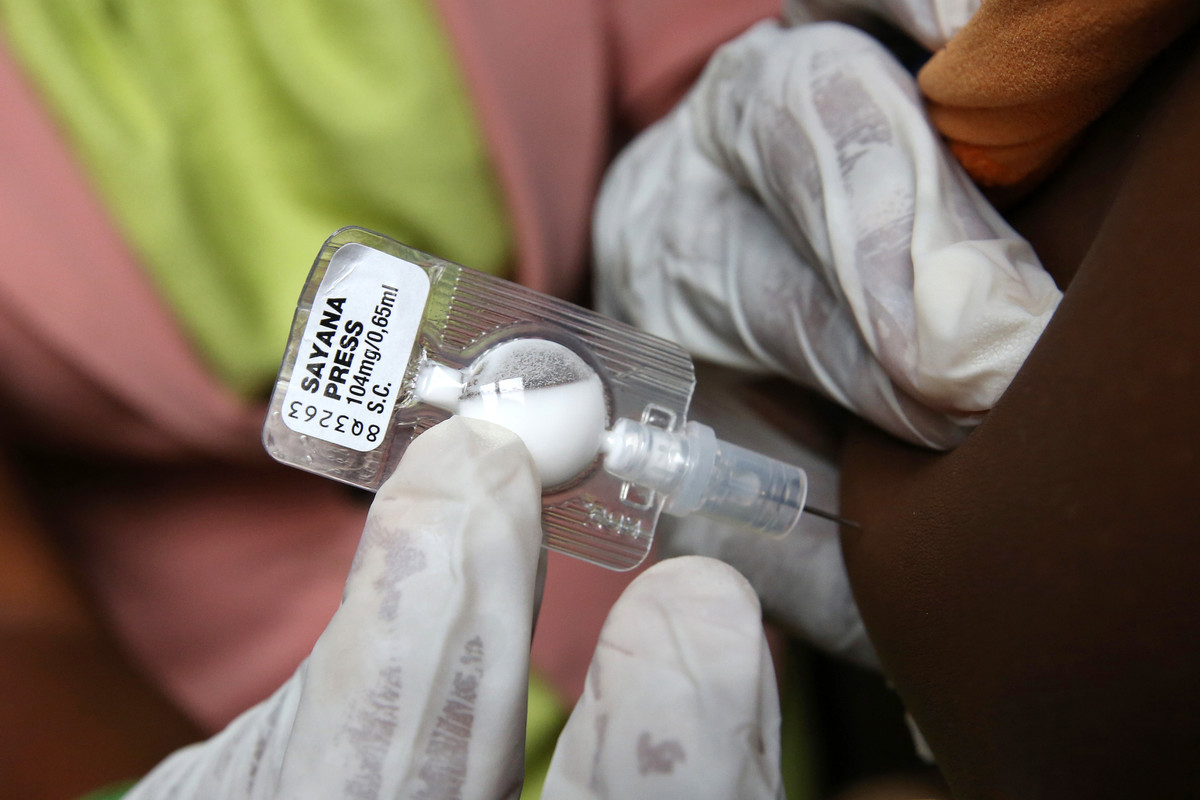
Sayana Press
Emiade Kudirat, 24, is a Community Health Extension Worker doing outreach in Nigeria. She specializes in the Sayana Press - a three-month, progestin-only injectable contraceptive favoured for its convenience in administration and portability. One patient, 24-year-old Bukola Polpoola, says she is happy that her treatment was free and easy.
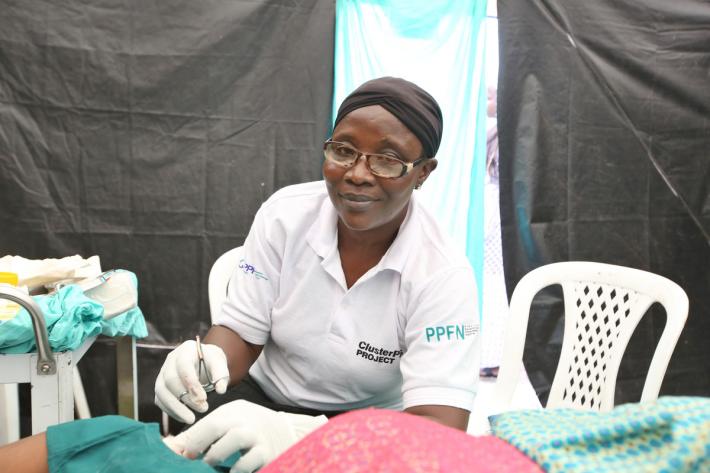
Public Facility Worker
Shodunke Mary, 53, has been a midwife from the Local Government Area Council for seven years in Nigeria. Now she is working with PPFN providing family planning counselling and a range of integrated sexual and reproductive health services. In addition, Mary also conducts on the job training to other facilities which are providing services for the PPFN model. "The model used by PPFN is successful because the services we provide are free, the providers are motivated and the community leaders are also involved in the implementation. Also, the commodities and equipment are always available."
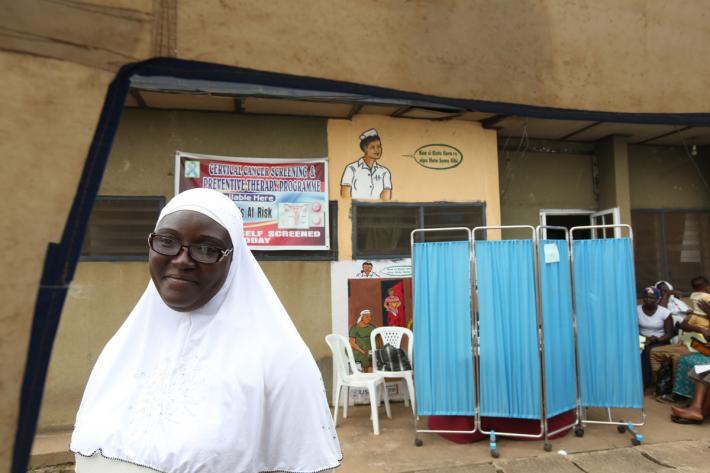
Serving the community
"As a child I loved the medical profession so much. The uniforms of the health workers always caught my eyes. And I knew one day, I would be wearing one of those uniforms serving my community.” Latifat Balogun explains how her childhood experiences led her to decide to train and work as a Community Health Extension Worker in Nigeria. She has been with PPFN for 20 years.
Pagination
- Previous page
- Page 17
- Next page






